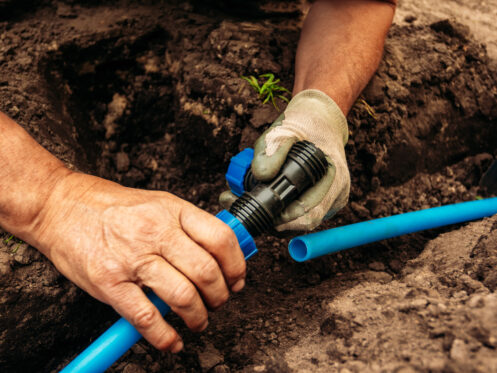Earthquakes are among the world’s most destructive natural disasters and can render significant damage to homes and buildings. They affect any infrastructure located underground, and this includes your plumbing and pipes. Plumbing destroyed during earthquakes can lead to flooding, contamination, toxic gas or sewage exposure, and direct damage to nearby structures like the foundation. A look at the top plumbing tips for earthquake zones can help you greatly reduce the risk of severe damage and safeguard your home.
Pre-Earthquake Plumbing Preparation Tips
If you live in an earthquake zone, there are steps you can take to protect your home before the first tremor hits. These actions include securing major appliances, installing flexible pipe connectors, locating your water and gas shut-off valves, and remaining consistent with scheduled maintenance or upgrades.
Secure Heavy Appliances and Water Heaters
Heavy appliances can tip over and cause significant damage or injury during an earthquake. Homeowners in earthquake zones should consider wall-mounting appliances like refrigerators or laundry machines. Unsecured water heaters are particularly dangerous during earthquakes because they are connected to gas lines, water lines, and electrical cords. A water heater that topples over and breaks during an earthquake can result in a natural gas explosion. Consider using seismic straps, braces, or similar safety tools to stabilize your water heater and prevent gas leaks or accidents.
Install Flexible Pipe Connectors
The shifting of rocks and soil can cause plumbing pipes to loosen at their joints during an earthquake. Even the earliest shockwaves or tremors can jostle pipes and dislodge any stiff or rigid points within your plumbing. To prevent this occurrence, consider installing flexible pipe connectors. For example, a plumber can install a braided stainless steel hose connector or reinforced rubber connector on all the major appliances or units within your home.
Locate Your Main Water Shutoff Valve
The main water shutoff valve is critical for stopping the flow of water in the event of flooding or leaks. Make sure that each occupant of your home knows the location of this valve and how to use any tools associated with it. For example, some valve models require a valve key or wrench to open or close completely. You can also ask your plumber about switching from the older gate model valve to an automatic valve instead.
Locate Your Gas Shutoff Valve
In addition to the main water valve, understanding your gas shutoff valve is equally important for safeguarding your home. Gas supply lines that become defective during natural disasters can lead to dangerous leaks. Check to make sure your gas shutoff valve is in functional working condition. You can also inquire with your plumber about installing an automatic gas shutoff valve. The latest automatic shutoff models turn off the gas supply upon detecting nearby seismic activity.
Ask About Anchoring the Foundation
Damage to underground plumbing can puncture or crack the foundation and lead to structural problems. Likewise, damage to the home’s foundation can put undue pressure on your plumbing system and result in problems like slab leaks. One possible way to safeguard your property before an earthquake is to anchor the foundation. During this process, a professional can anchor your walls to your foundation’s slab, which can help prevent the rupture of utility lines. Anchoring typically takes place in the crawlspace, and your professional may use anchor bolts to help secure structural components in place.
Schedule Plumbing Maintenance or Upgrades
Keeping up with routine maintenance is one of the most important preventative steps you can take before an earthquake. Maintenance allows your plumber to address any cracks, holes, tears, or leaks in your pipes before they escalate into major problems or undermine the rest of your plumbing system. They can also assess your plumbing system to see when it’s due for an upgrade. For example, some older homes have aging galvanized steel pipes that are more susceptible to damage from earthquakes. Your plumber can help you update your plumbing with sturdy and flexible materials that can better withstand seismic movement.
Plumbing Tips During an Earthquake
During an earthquake, it is paramount to look out for the safety and well-being of your entire family. Plumbing experts advise avoiding water areas and remaining mindful of aftershocks.
Find Shelter and Avoid Water Areas
If an earthquake occurs while you are indoors, experts advise taking cover under a desk or table and holding on until the end of the tremors. Try to avoid doorways, windows, or heavy furniture that can topple. You should also stay away from the direct line of water fixtures or major appliances. Standing near a burst pipe or any sudden pressurized flow of water can result in injury.
Remain Alert for Aftershocks
It is also important to remember that aftershocks may occur within an hour of the main earthquake. Most experts advise remaining on the alert for at least one aftershock. Stay cautious and mindful as you begin to check on others in the household after the initial earthquake.
Post-Earthquake Plumbing Tips
Once the earthquake is over, the real work begins of making sure your plumbing system is functional again. Failure to follow up can subject your home to catastrophic water damage or even expose your family to toxic fumes or health hazards. Some of the most important steps to take after an earthquake include checking for water leaks, inspecting for gas leaks, and ensuring there are no sewer line problems within the home.
Check for Water Leaks
Water lines run throughout the walls of your home. Unfortunately, shifting soil may loosen or dislodge these lines. Signs of a possible water leak after an earthquake include wet spots on your walls or ceiling as well as the sound of running water behind walls. You may also hear trickling or dripping even if none of your faucets are turned on as well as low water pressure when you do turn on your faucets.
Check for Gas Leaks
Natural gas leaks are highly toxic to the occupants of your home. While natural gas is odorless, natural suppliers add a chemical known as mercaptan to make gas leaks easier to detect. This chemical smells like sulfur or rotten eggs. If you notice this smell throughout your home after an earthquake, vacate the premises and call a professional. Even if you do not smell mercaptan, another common sign of a gas leak is a persistent hissing sound in your house.
Check for Sewer Line Problems
The sewer line carries all wastewater from your drains and toilets away from the home. It is located deep underground, and any damage to your sewer line can expose your family to harmful microorganisms or bacteria. Signs of sewer line damage after an earthquake include the smell of sewage from your floors or yard, wet spots or depressions in your lawn, or backups within the drains of your house. Plumbers have the equipment to fix sewer lines without cross-contaminating your living area and creating health risks.
Contact Us Today
The aftermath of an earthquake can cause plumbing problems that impact your family. Fortunately, Huft Home Services provides premier plumbing services for homes in Sacramento, CA. Our certified plumbers can repair or replace water lines, gas lines, or sewer lines. We can service and secure your traditional water heater or help you upgrade to a wall-mounted tankless water heater. In addition to conventional plumbing, we can help with sump pumps or any water quality solution like water softening or filtration. Contact Huft Home Services today for all your plumbing needs.



